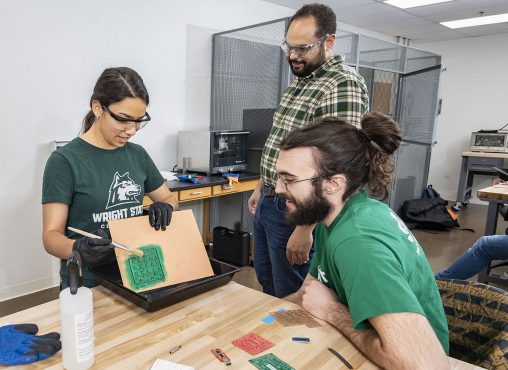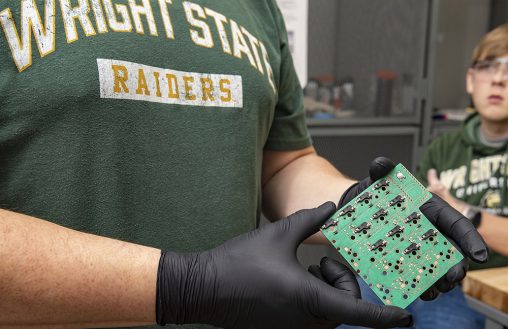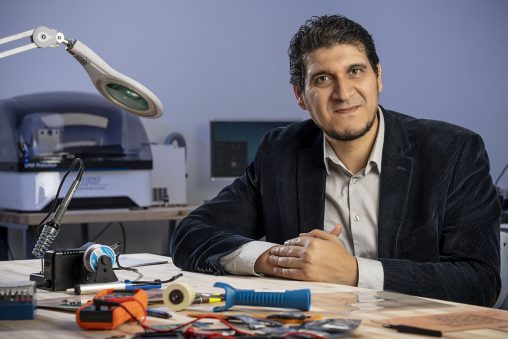
Located in the basement of the Russ Engineering Center, the Digital Microelectronics Lab provides a space where students can learn not just how to design and build microelectronics but also how to test and assure that they are free of malicious software and hardware. (Photos by Erin Pence)
Wright State University computer science and engineering students will be able to learn how to design and fabricate circuit boards and other microelectronics in a new lab supported by a $14.5 million Air Force contract.
Located in the basement of the Russ Engineering Center, the Digital Microelectronics Lab provides a space where students can receive the hands-on training needed to work in the microchip and microelectronic fields.
Students will learn not just how to design and build microelectronics but also how to test and assure that circuit boards, microchips and microelectronics are free of malicious software and hardware and, therefore, are safe to use.
“We want to teach the students how they fabricate the device here so we can prepare the workforce for the Air Force and Intel or other manufacturers,” said Fathi Amsaad, Ph.D., assistant professor of computer science, who is the principal investigator on Wright State’s Assured Digital Microelectronics Education and Training Ecosystem (ADMETE) grant.
The Digital Microelectronics Lab is supported by the ADMETE contract awarded by the U.S. Air Force to Wright State and the University of Akron, Youngstown State, Ohio University, the University of Toledo and Lorain County Community College.
Overseen by Wright State, the ADMETE program seeks to develop a pipeline of trained undergraduate engineering and computer science students who have the skills to design and develop trusted and protected microelectronic devices and systems.
Students learn to create microelectronic devices using industry standards, gain the skills needed to recognize and address the threat of malicious digital hardware and develop secure designs in the fabrication process. An emphasis of the program is training students in the skills to analyze whether microchips and electronic devices have been manipulated and whether they can only perform the function for which they were designed.

The Digital Microelectronics Lab features state-of-the-art equipment on which students can experiment with designing and fabricating multilayered circuit boards.
Wright State and the other institutions in the program share curriculum and research, and students from participating universities can take courses at other institutions in the program.
The Digital Microelectronics Lab provides a place for undergraduate students to conduct cybersecurity research and work on hands-on projects.
It features state-of-the-art equipment on which students can experiment with designing and fabricating multilayered circuit boards, an important security component. Students can also learn how to reverse engineer commercially made microelectronics to understand how they can be tampered with.
“We want to make sure they understand that security is part of the design,” Amsaad said. “It’s important to ensure the chips can be trusted” because they can be manipulated.
Amsaad, who earned his Ph.D. in engineering, with an emphasis on computer science and engineering, from the University of Toledo, has a background in hardware security and trust. His research focuses on assured and trusted microelectronics security that enables the authentication and reliability of digital microelectronic systems.
Amsaad said the building blocks of the ADMETE program include developing new courses and improving existing courses and introducing new topics related to computer engineering, computer science and cybersecurity that help students understand security at the hardware level.
Wright State’s Department of Electrical Engineering offers a minor in assured and trusted digital microelectronics, which is open to students of all majors, as well as an ADMETE Scholarship.
The Digital Microelectronics Lab is already having an effect on students like computer engineering major Mason McDaniel. McDaniel is a student worker on a team led by Matt Kijowski, cyber systems program manager, that set up the lab and developed a process to teach other students circuit board fabrication.
Working in the lab has become a hobby for McDaniel, who also decided to minor in assured and trusted digital microelectronics.
“I came down here on my own time to work on soldering these boards, trying to get these things working,” he said.

Fathi Amsaad, Ph.D., assistant professor of computer science, is the principal investigator on Wright State’s Assured Digital Microelectronics Education and Training Ecosystem (ADMETE) grant.
Eventually, the lab will be able to host outreach classes for high school students and professional engineers and computer scientists who want to learn how to fabricate microelectronics.
“A lot of the engineers and computer scientists I have worked with have a lot of theoretical ideas but don’t have hands-on experience with things like building a circuit board. So, I think this will add to their capabilities, give them at least some familiarity with how things are built,” said Billy Kelley, manager of the Digital Microelectronics Lab.
Amsaad already has plans to expand the ADMETE program at Wright State by developing a larger teaching lab in the Russ Engineering Center. He also hopes to create more hardware security and cybersecurity courses.
“We laid out the foundation, now we are trying to put on the roof as the next stage,” Amsaad said. “We are excited to bring this to the next level in creating a regional compact. We want to train more people from the Air Force, from industry and engage in activities with them and create potentially a broader impact.”

 Walking through open doors
Walking through open doors  Adventures await
Adventures await  Wright State to expand nursing facilities to meet workforce needs and prepare more graduates for in-demand careers
Wright State to expand nursing facilities to meet workforce needs and prepare more graduates for in-demand careers  Wright State student-athletes make a lasting impact on local family with more to come
Wright State student-athletes make a lasting impact on local family with more to come  Wright State names Rajneesh Suri dean of Raj Soin College of Business
Wright State names Rajneesh Suri dean of Raj Soin College of Business 